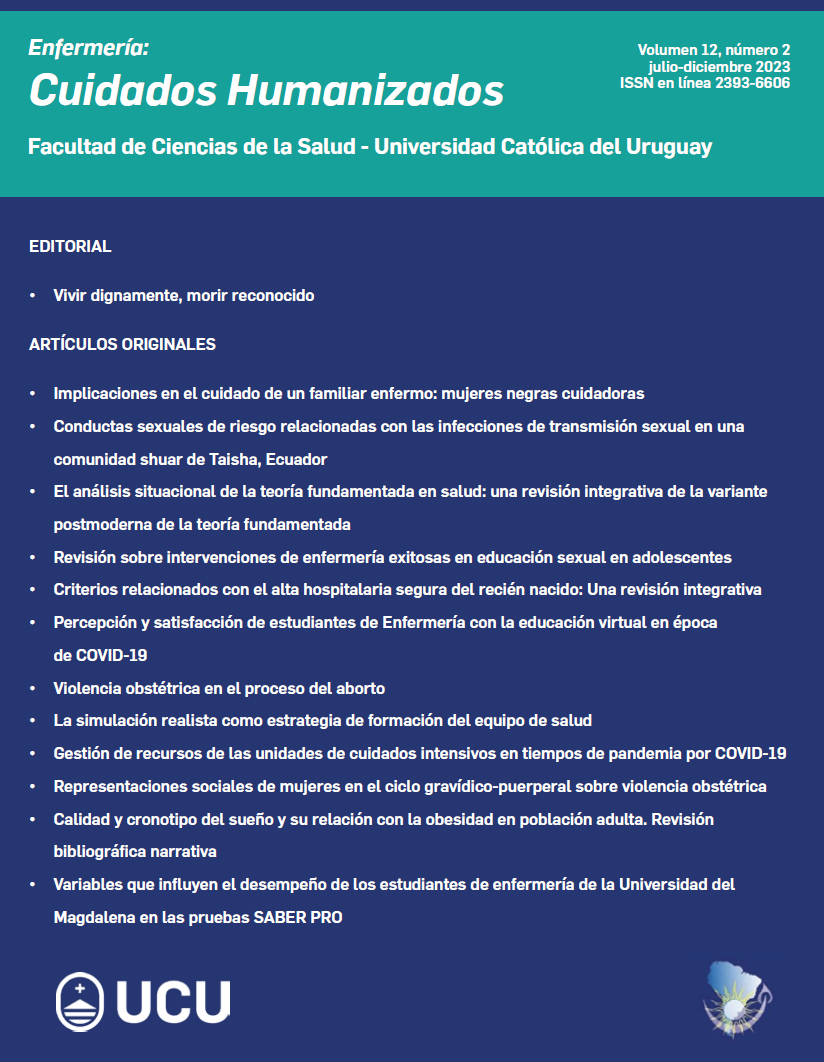El análisis situacional de la teoría fundamentada en salud: una revisión integrativa de la variante postmoderna de la teoría fundamentada
DOI:
https://doi.org/10.22235/ech.v12i2.3108Palabras clave:
investigación cualitativa, planificación en salud, investigación en enfermería, política públicaResumen
Introducción: La complejidad de la época actual exige tener en cuenta enfoques cuantitativos y cualitativos, datos de diferentes fuentes, métodos múltiples y un crisol de enfoques. Para dar respuesta a esta complejidad se presenta el análisis situacional como método posible. Metodología: Se presenta una revisión integrativa en relación con la variante de análisis situacional, que sigue los siguientes pasos: 1) identificación del problema (pregunta y objetivo de la investigación claramente definidos); 2) búsqueda bibliográfica (estrategia de búsqueda exhaustiva); 3) evaluación de datos; 4) análisis de datos (reducción de datos, visualización, comparación y conclusiones); y 5) presentación de los resultados así como las implicaciones para la práctica, la política públicas y las futuras investigaciones. Resultados: Emerge literatura que da cuenta del análisis situacional como una metodología utilizada en educación en salud, gestión en salud, políticas públicas y atención en salud, que incorpora elementos del análisis de discurso y teorías poshumanistas. Conclusiones: El análisis situacional es una metodología de comprensión de los fenómenos sociales, culturales, sanitarios y de educación, que está disponible y es acorde con la mirada multidimensional requerida para comprender la complejidad del entorno y fluidez de la era que estamos viviendo.
Descargas
Citas
Ward PR. A sociology of the Covid-19 pandemic: A commentary and research agenda for sociologists. J Sociol. 2020 Jul 20;56(4):144078332093968.
Tenny S, Sharts-Hopko NC. Qualitative Study [Internet]. National Library of Medicine. StatPearls Publishing; 2019. Disponible en: https://www.ncbi.nlm.nih.gov/books/NBK470395/
Chun Tie Y, Birks M, Francis K. Grounded Theory research: a design framework for Novice Researchers. SAGE Open Medicine [Internet]. 2019 Jan 2;7(1):205031211882292. Disponible en: https://www.ncbi.nlm.nih.gov/pmc/articles/PMC6318722/
Morse JM, Bowers BJ, Charmaz K, Corbin J, Clarke AE, Stern PN. Developing Grounded Theory: The Second Generation. Routledge; 2016.
Clarke AE, Friese C, Washburn RS. Situational Analysis. SAGE Publications; 2017.
Clarke AE, Washburn R, Friese C. Situational analysis in practice: mapping relationalities across disciplines. New York: Routledge; 2022.
Clarke AE, Friese C, Washburn R. Situational analysis in practice: mapping research with grounded theory. Walnut Creek, California: Left Coast Press; 2015.
Kalenda J. Situational analysis as a framework for interdisciplinary research in the social sciences. Human Affairs. 2016 Jan 1;26(3).
Clarke AE, Washburn R, Friese C. Introducing situational analysis. In: Situational Analysis in practice: Mapping relationalities across disciplines. 2d ed. London: Routledge; 2022, p. 13-14.
Vasconcelos A, Sen B, Rosa A, Ellis D. Elaborations of grounded theory in information research: Arenas/Social Worlds Theory, discourse, and situational analysis. Library and Information Research. 2012;36(112):120-46.
Whittemore R, Knafl K. The integrative review: updated methodology. J Adv Nurs. 2005 Dec;52(5):546-53. doi: 10.1111/j.1365-2648.2005.03621.x. PMID: 16268861.
Badu E, O’Brien AP, Mitchell R. An integrative review on methodological considerations in mental health research – design, sampling, data collection procedure and quality assurance. Arch Public Health. 2019;77:37. doi: 10.1186/s13690-019-0363-z
Ahmady S, Khani H. The situational analysis of teaching-learning in clinical education in Iran: a postmodern grounded theory study. BMC Med Educ [Internet]. 2022;22(1):520. doi: 10.1186/s12909-022-03577-3
Almas A, Awan S, Bloomfield G, Nisar MI, Siddiqi S, Ahmed A, et al. Opportunities and challenges to non-communicable disease (NCD) research and training in Pakistan: a qualitative study from Pakistan. BMJ Open [Internet]. 2022;12(12):e066460. doi: 10.1136/bmjopen-2022-066460
Andreae MH, Dudak A, Cherian V, Dhar P, Dalal PG, Po W, et al. Data and debriefing observations on healthcare simulation to prepare for the COVID-19 pandemic. Data Brief [Internet]. 2020;31:106028. doi: 10.1016/j.dib.2020.106028
Whittaker JD, Davison I. A lack of communication and awareness in nontechnical skills training? A qualitative analysis of the perceptions of trainers and trainees in surgical training. J Surg Educ [Internet]. 2020;77(4):873-88. doi: 10.1016/j.jsurg.2020.01.006
Coe D, Dorgan S, Smith J, Wroe C. Identification of the ideal recruitment situation in pandemic research: learning from the RECOVERY trial in Northern England: a qualitative study. BMJ Lead [Internet]. 2022;0:1-9. doi: 10.1136/leader-2021-000566
Singhal S, Hosking I, Ward J, Boyle AA. A qualitative study: What do nurses in charge in emergency departments do? Cureus [Internet]. 2021;13(9):e17912. doi: 10.7759/cureus.17912
Klingler C, Ismail F, Marckmann G, Kuehlmeyer K. Medical professionalism of foreign-born and foreign-trained physicians under close scrutiny: A qualitative study with stakeholders in Germany. PLoS One [Internet]. 2018;13(2):e0193010. doi: 10.1371/journal.pone.0193010
Turnbull LL, Carr SM. The collaboration compass: A preliminary model for navigating collaborative practice. J Multidiscip Healthc [Internet]. 2020;13:1107-20. doi: 10.2147/JMDH.S257160
Miri K, Mohammadi E, Vanaki Z. Trend in the role of licensed practical nurses in health care system: A situational analysis. Nurs Forum [Internet]. 2021;56(1):9-18. doi: 10.1111/nuf.12501
Öhman A, Keisu B-I, Enberg B. Professional knowledge development and evidence-based practice in confusing vs. supportive work organizations: A grounded theory situational analysis of Swedish elderly care. Physiother Theory Pract [Internet]. 2022;1–13. doi: 10.1080/09593985.2022.2033370
Verma A, Sahay S. Healthcare needs and programmatic gaps in transition from pediatric to adult care of vertically transmitted HIV infected adolescents in India. PLoS One [Internet]. 2019;14(10):e0224490. doi: 10.1371/journal.pone.0224490
McCalman J, Bainbridge R, Brown C, Tsey K, Clarke A. The aboriginal Australian family wellbeing program: A historical analysis of the conditions that enabled its spread. Front Public Health [Internet]. 2018;6. doi: 10.3389/fpubh.2018.00026
Ramírez-Pereira M, Pérez Abarca R, Machuca-Contreras F. Políticas públicas de promoción de salud en el contexto de la COVID-19, en Chile, una aproximación desde el análisis situacional. Glob Health Promot [Internet]. 2021;28(1):127-36. doi: 10.1177/1757975920978311
Friesinger JG, Topor A, Bøe TD, Larsen IB. The ambiguous influences of fire safety on people with mental health problems in supported housing. Palgrave Commun [Internet].2019;5(1). doi: 10.1057/s41599-019-0230-0
Kydonaki K, Kean S, Tocher J. Family INvolvement in inTensive care: A qualitative exploration of critically ill patients, their families and critical care nurses (INpuT study). J Clin Nurs [Internet]. 2020;29(7-8):1115–28. doi: 10.1111/jocn.15175
Gordon I, Ling J, Robinson L, Hayes C, Crosland A. Talking about depression during interactions with GPs: a qualitative study exploring older people’s accounts of their depression narratives. BMC Fam Pract [Internet]. 2018;19(1):173. doi: 10.1186/s12875-018-0857-8
Lake KJ, Boyd MA, Smithers L, Howard NJ, Dawson AP. Exploring the readiness of senior doctors and nurses to assess and address patients’ social needs in the hospital setting. BMC Health Serv Res [Internet]. 2022;22(1):246. doi: 10.1186/s12913-022-07642-x
Ivany AS, Bullock L, Schminkey D, Wells K, Sharps P, Kools S. Living in fear and prioritizing safety: Exploring women’s lives after traumatic brain injury from intimate partner violence. Qual Health Res [Internet]. 2018;28(11):1708-18. doi: 10.1177/1049732318786705
Navvabi-Rigi S-D, Mohammadi-Shahboulaghi F, Foroughan M, Momtaz YA. Weaving a cocoon on the way to aging transcendence: Grounded theory study on aging perception during menopause transition. PLoS One [Internet]. 2022;17(11):e0276797. doi: 10.1371/journal.pone.0276797
Brien BO, Andrews T, Savage E. Nurses keeping patients safe by managing risk in perioperative settings: A classic grounded theory study. J Nurs Manag [Internet]. 2019;27(7):1454-61. doi: 10.1111/jonm.12829
Treiber D, Booysen LAE. Identity (re)construction of female adolescents with substance use disorders. Int J Environ Res Public Health [Internet]. 2021;18(13):7022. doi: 10.3390/ijerph18137022
Crossway A, Rogers SM, Nye EA, Games KE, Eberman LE. Lesbian, gay, bisexual, transgender, and Queer Athletic Trainers: Collegiate student-athletes' perceptions. Journal of Athletic Training. 2019;54:324-333.
Latchem-Hastings J. Caring relations at the margins of neurological care home life: The role of ‘hotel service’ staff in brain injury rehabilitation. J Long Term Care [Internet]. 2021;12-23. doi: 10.31389/jltc.49
Hofstetter L, Tinhof V, Mayfurth H, Kurnikowski A, Rathkolb V, Reindl-Schwaighofer R, et al. Experiences and challenges faced by patients with COVID-19 who were hospitalised and participated in a randomised controlled trial: a qualitative study. BMJ Open [Internet]. 2022;12(10):e062176. doi: 10.1136/bmjopen-2022-062176
Hengyotmark A, Kusoom W. Physical as well as psychological distress and coping with situational dilemmas experienced by people infected with COVID-19: A mixed method study. Int J Environ Res Public Health [Internet]. 2022;19(22):14657. doi: 10.3390/ijerph192214657
Nyerges EX, Dajani MA, Kacmar AM, Gunathilake WAPM, Harris LM. Situating within the balance: A qualitative study exploring interpreters’ experiences working with refugees in the United States. Health Soc Care Community [Internet]. 2022;30(6):e6185–93. doi: 10.1111/hsc.14055
Revell ER, Gillespie D, Morris PG, Stone J. Drop attacks as a subtype of FND: A cognitive behavioural model using grounded theory. Epilepsy Behav Rep [Internet]. 2021;16(100491):100491. doi: 10.1016/j.ebr.2021.100491
Descargas
Publicado
Cómo citar
Número
Sección
Licencia
Derechos de autor 2023 Enfermería: Cuidados Humanizados

Esta obra está bajo una licencia internacional Creative Commons Atribución 4.0.

















